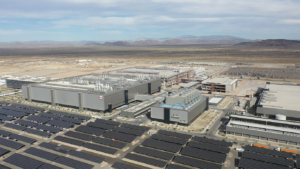Arizona is on the cusp of a technological renaissance, poised to solidify its status as a national and global leader in key industries like artificial intelligence, semiconductor manufacturing and clean energy. Following a challenging period of economic recalibration, the state is gearing up for a remarkable rebound in 2025. This article explores how these critical technologies will contribute to an economic boom and enhance Arizona’s innovation ecosystem and offer a 2025 technology outlook for Arizona.
MORE NEWS: The 10 fastest-growing housing markets in Arizona
Semiconductor manufacturing: A transformative boom
Arizona’s semiconductor industry, led by giants like Taiwan Semiconductor Manufacturing Company (TSMC) and Intel, is set to dominate the national landscape. TSMC’s $65 billion investment in multiple fabrication facilities in Phoenix is a game-changer, bringing the promise of more than 6,000 high-tech jobs and spurring the creation of thousands more in supporting industries. With the focus on producing cutting-edge chips, TSMC’s facilities are projected to come online in 2025, signaling a significant economic boost.
Complementing TSMC’s efforts, Intel is investing $20 billion to expand its Chandler facility, adding 9,000 new jobs. Supporting this ecosystem is Amkor Technology, which is building a $2 billion advanced packaging facility in Peoria. Meanwhile, Arizona State University’s establishment of Southwest Advanced Prototyping Hub cements the state’s role as a leader in semiconductor research and development.
In support of testing and adopting, the State of Arizona is dedicated to documenting best practices for the safe, effective and responsible use of Gen AI throughout state government. Gov. Katie Hobbs recently announced the creation of an AI Steering Committee to help inform and drive the future deployment of artificial intelligence in the state. The newly formed steering group will explore ways Gen AI can benefit the public and shape policies that promote transparency and ethical and responsible use of the technology.
These developments ensure Arizona remains at the forefront of semiconductor innovation, fueling industries like artificial intelligence, healthcare and renewable energy.
Artificial intelligence: Driving innovation across sectors
Artificial intelligence (AI) is revolutionizing industries worldwide, and Arizona is embracing this transformative technology. The state is home to more than 700 software companies, many leveraging AI to enhance operations and create innovative solutions. Companies like Synapse Labs and Mercurio Analytics exemplify Arizona’s AI leadership by addressing challenges in sectors like health care and government through cutting-edge AI tools.
The Arizona Technology Council’s Arizona Artificial Intelligence Ecosystem Committee is playing a crucial role in fostering responsible AI adoption. Initiatives such as the establishment of AI-focused educational programs at Arizona State University and Maricopa County Community College District underscore the state’s commitment to workforce development. With AI chips from TSMC poised to power the next wave of applications, Arizona is emerging as a hub for AI-driven hardware and software innovation.
Clean energy and electric vehicles: Powering a sustainable future
Arizona’s clean energy initiatives are also poised for significant expansion in 2025. The state’s abundant sunshine and critical mineral resources make it an ideal location for solar energy and battery production. Companies like Meyer Burger and JA Solar are advancing photovoltaic technology while battery manufacturers such as KORE Power, American Battery Factory, American Battery Factory and LG are driving innovation in energy storage.
Electric vehicle production is another cornerstone of Arizona’s clean energy strategy. Manufacturers like Lucid and Nikola have established robust supply chains in the state, complemented by battery recycling pioneers like Ecobat and Li-Cycle. These developments not only support sustainability but also reinforce Arizona’s position as a leader in the clean energy transition.
Emerging technologies: From optics to data centers
Beyond AI and semiconductors, Arizona’s technology landscape is enriched by its legacy in optics and photonics. The state ranks first nationally for job growth in this sector, driven by innovative companies and a strong talent pipeline.
Data centers are also proliferating across Arizona, driven by the digital economy’s growing demands. However, their energy and water usage present sustainability challenges. Innovations in energy-efficient data center operations are expected to mitigate these concerns while creating jobs and fostering technological advancements.
Public policy and workforce development: Foundations for growth
The Arizona Commerce Authority (ACA) and initiatives to improve STEM education are critical to sustaining the state’s technological momentum. The ACA has been instrumental in attracting investments from global technology leaders like TSMC and Intel. Simultaneously, efforts to integrate computer science into K-12 curricula are preparing a new generation for careers in tech.
The focus on workforce development extends to partnerships like ElevateEdAZ, which bridges education and industry to equip students with skills for AI and other emerging technologies. These initiatives are essential for building a skilled workforce capable of driving Arizona’s innovation ecosystem forward.
Additionally, TSMC, alongside Gov. Katie Hobbs and Phoenix Mayor Kate Gallego, announced an expansion of the company’s apprenticeship program, which now includes students attending Estrella Mountain Community College, Rio Salado College, Northern Arizona University, Grand Canyon University and West-MEC (Western Maricopa Education Center). Program graduates, including those lacking four-year degrees, are expected to fill most of the jobs at TSMC’s facilities.
A vision for 2025 and beyond
Arizona’s strategic investments in AI, semiconductor manufacturing and clean energy are laying the groundwork for a vibrant innovation ecosystem. These industries are not only transforming the state’s economic landscape but also positioning Arizona as a global leader in technology. With robust public policy support and a focus on education, Arizona is ready to seize the opportunities of 2025 and lead the nation into a new era of technological advancement.
Author: Steven G. Zylstra is the president and CEO of the Arizona Technology Council.




